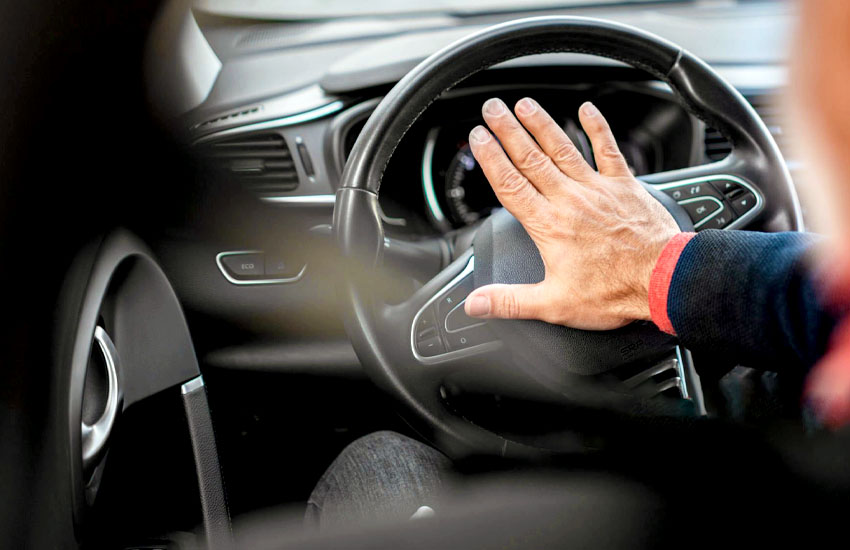Car makes noise when turning right but not left? This issue can be caused by worn-out CV joints or a failing wheel bearing.
Here are the possible causes and fixes for this problem. Is your car making weird noises only when you make right turns? It’s frustrating, isn’t it? Identifying the exact cause of this issue is crucial to ensure your safety and prevent further damage to your vehicle.
We will explore the potential reasons why your car makes noise when turning right but not left and discuss the appropriate fixes for each possible cause. By understanding the underlying problems, you can take the necessary steps to resolve the issue and enjoy a smooth and quiet ride once again. So, let’s dive into the possible causes and fixes for this particular car problem.

Causes Of Car Noise When Turning Right
Car noise when turning right is a common issue with possible causes such as worn-out CV joints, low power steering fluid, or damaged suspension components. To fix the problem, you might need to replace the faulty parts or get a professional inspection.
When your car makes noise specifically when turning right, it can be both frustrating and concerning. However, understanding the potential causes can help you diagnose and resolve the issue quickly. Two common culprits are worn CV joints and low power steering fluid.
Worn CV Joint
One of the primary causes of a car making noise when turning right is a worn CV joint. The CV joint, also known as the Constant Velocity joint, allows power to be transmitted from the engine to the wheels while maintaining flexibility.
Over time, the protective rubber boot surrounding the CV joint can degrade or crack, leading to the entry of dirt, debris, and moisture. This, in turn, results in accelerated wear and tear, manifesting as a clicking or popping noise when turning.
It’s important to address this issue promptly, as continued driving with a worn CV joint can cause further damage and potential failure, resulting in a complete loss of power to the wheels. To rectify the problem, it may be necessary to replace the entire CV joint assembly or the affected CV boot, depending on the extent of the damage.
Low Power Steering Fluid
Another possible cause for a car making noise when turning right is low power steering fluid. The power steering system relies on a hydraulic pump that circulates fluid to assist with steering efforts. If the fluid level is insufficient, it can lead to inadequate lubrication and hydraulic pressure, causing the system to produce a whining or groaning sound.
Checking the power steering fluid level is a relatively simple task. Start by locating the power steering fluid reservoir, usually near the engine. Remove the cap and utilize the dipstick or a special indicator on the reservoir to verify the fluid level.
If it is below the recommended level, topping it up with the appropriate fluid can often resolve the issue. However, if the fluid level consistently drops over time, there may be an underlying leak that needs to be addressed by a professional mechanic.
| Cause | Noise Description |
|---|---|
| Worn CV Joint | Clicking or popping |
| Low Power Steering Fluid | Whining or groaning |
By understanding the causes of car noise when turning right, you can take appropriate action to address the issue. Whether it requires replacing a worn CV joint or topping up the power steering fluid, resolving these problems promptly can help ensure a smooth and safe driving experience.
Fixes For Car Noise When Turning Right
If your car makes a noise when turning right, it can be frustrating and concerning. Fortunately, there are several potential fixes that may help eliminate this annoying issue. By addressing the specific causes of the noise, you can enjoy a quieter, smoother ride.
Replace Cv Joint
A common cause of noise when turning right is a worn or damaged CV (constant-velocity) joint. Replacing the CV joint can often resolve this issue. This entails removing the old joint and installing a new one to restore optimal performance and reduce noise during turns.
Top Up Power Steering Fluid
In some cases, inadequate power steering fluid can lead to noise when turning right. Top up the power steering fluid to the recommended level, following the manufacturer’s guidelines. This can help ensure proper lubrication and functioning of the steering system, minimizing noise during right turns.
Causes Of Car Noise When Turning Left
Turning left in your car should be a smooth and silent action. However, if you notice that your car is making noise when turning left, it could be a sign of underlying issues. Identifying the cause of this noise is crucial in order to address the problem as soon as possible. In this section, we will discuss two common causes of car noise when turning left: worn wheel bearings and faulty suspension components.
Worn Wheel Bearing
One possible cause of car noise when turning left is a worn wheel bearing. Wheel bearings are responsible for reducing friction between the wheel and the axle, allowing for smooth and effortless rotation.
Over time, these bearings can wear out due to constant use and exposure to external elements. When a wheel bearing becomes worn, it can cause a rumbling or grinding noise when turning. This noise may be more noticeable when turning left due to the added stress placed on the left side of the vehicle.
If you suspect that a worn wheel bearing is causing the noise when turning left, it is essential to have it inspected and replaced by a certified mechanic. Ignoring the issue can lead to further damage and potentially unsafe driving conditions.
Faulty Suspension Component
Another possible cause of car noise when turning left is a faulty suspension component. The suspension system of your car is responsible for providing a smooth and comfortable ride by absorbing the impact of uneven road surfaces. However, if any of the suspension components, such as the struts, ball joints, or control arms, become worn or damaged, they can produce noise when turning left.
A faulty suspension component can cause a variety of noises, including clunking, popping, or squeaking sounds. These noises may become more pronounced when turning left due to the weight transfer that occurs during the turn. It is important to have your suspension system inspected and repaired by a professional mechanic to ensure the safety and performance of your vehicle.
Fixes For Car Noise When Turning Left
Replace Wheel Bearing
If your car is making noise when turning left, a worn-out or damaged wheel bearing could be the culprit. The wheel bearing is responsible for allowing smooth rotation of the wheels. Over time, these bearings can wear out due to regular use and exposure to various factors like dirt and moisture. To replace the wheel bearing, follow these steps:
- Safely lift the vehicle using jack stands or a hydraulic lift.
- Remove the wheel and tire assembly.
- Detach the brake caliper and rotor from the hub assembly.
- Locate and remove the axle nut that secures the wheel bearing.
- Take out the old wheel bearing by carefully pulling it out or using specialized bearing removal tools.
- Install the new wheel bearing by aligning it properly with the hub assembly.
- Reassemble the brake caliper, rotor, and wheel assembly.
- Lower the vehicle and test-drive to ensure the noise is eliminated when turning left.
Repair Suspension Component
If replacing the wheel bearing doesn’t solve the noise issue when turning left, it could be due to a problem with the suspension components. Here are a few steps to repair the suspension components:
- Inspect the suspension components, including the control arms, bushings, and ball joints, for any visible damage, wear, or looseness.
- Replace any worn or damaged suspension components.
- Check the alignment of the wheels and adjust if necessary.
- Ensure that all bolts and nuts are tightened to the manufacturer’s specifications.
- Test-drive the vehicle to verify that the noise has been resolved when turning left.
By proactively addressing the wheel bearing and suspension component issues, you can restore the smooth and silent operation of your car when turning left. Regular maintenance and inspections can help prevent these problems from occurring in the first place.
Other Possible Causes
When a car makes a noise when turning right but not left, there can be various reasons behind it. Other possible causes should be considered to diagnose and fix the issue effectively. Let’s explore some other potential culprits.
Faulty Tie Rod
A faulty tie rod can cause a car to make noise when turning right but not left. The tie rod connects the steering knuckle to the rack-and-pinion or steering gear, and if it’s worn or damaged, it can create unusual noises. Inspect the tie rod for any signs of wear or damage, such as looseness, play, or visible cracks.
Loose Or Damaged Belt
A loose or damaged belt, particularly the accessory drive belt or the power steering belt, can lead to noise when turning right. A worn-out belt may slip or produce squealing sounds during right turns. Check the condition and tension of the belts, and replace them if necessary to eliminate this potential cause of the problem.
Other Possible Fixes
If your car makes noise when turning right but not left, there are several possible fixes that you can explore. These fixes can help address the underlying issue causing the noise and restore a smooth and quiet driving experience. In this section, we will discuss some of the other possible fixes that you can consider.
Replace Tie Rod
If your car is making noise when turning right, the tie rod could be the culprit. The tie rod is a crucial component of your car’s steering system that connects the steering rack to the steering knuckle. Over time, the tie rod can wear out or become loose, leading to a clunking or knocking noise when turning right.
To fix this issue, you may need to replace the tie rod. This involves removing the old tie rod and installing a new one. It is recommended to consult a professional mechanic for this task, as improper installation can lead to further steering problems.
Tighten Or Replace Belt
Another possible cause of the noise when turning right is a loose or worn-out belt. The belt in your car’s engine powers various components such as the alternator, power steering pump, and air conditioning compressor. If the belt becomes loose or worn, it can generate a squealing noise when the engine is under load, such as when turning right.
To fix this issue, you can start by checking the belt tension. If the belt is loose, you can tighten it using the appropriate tools. However, if the belt shows signs of wear or damage, it is recommended to replace it with a new one. Remember to consult your car’s manual or a professional mechanic for the correct procedures and specifications.
Conclusion
In closing, identifying the specific cause of the noise when turning right but not left is crucial for proper resolution. By seeking professional help and thoroughly examining key components such as the steering, suspension, and wheel bearings, you can effectively address the issue.
Remember to prioritize safety and timely maintenance for a smooth driving experience.


